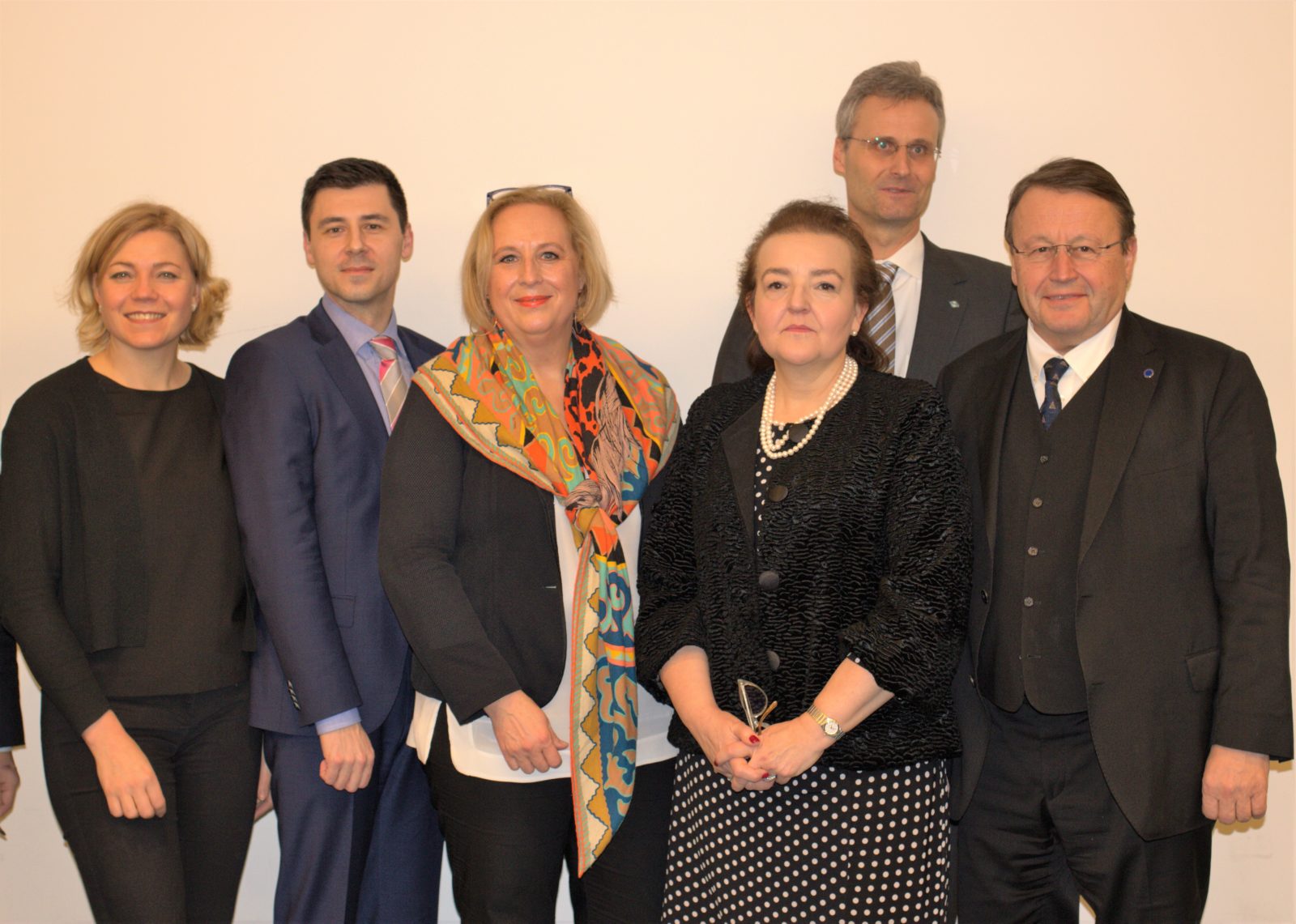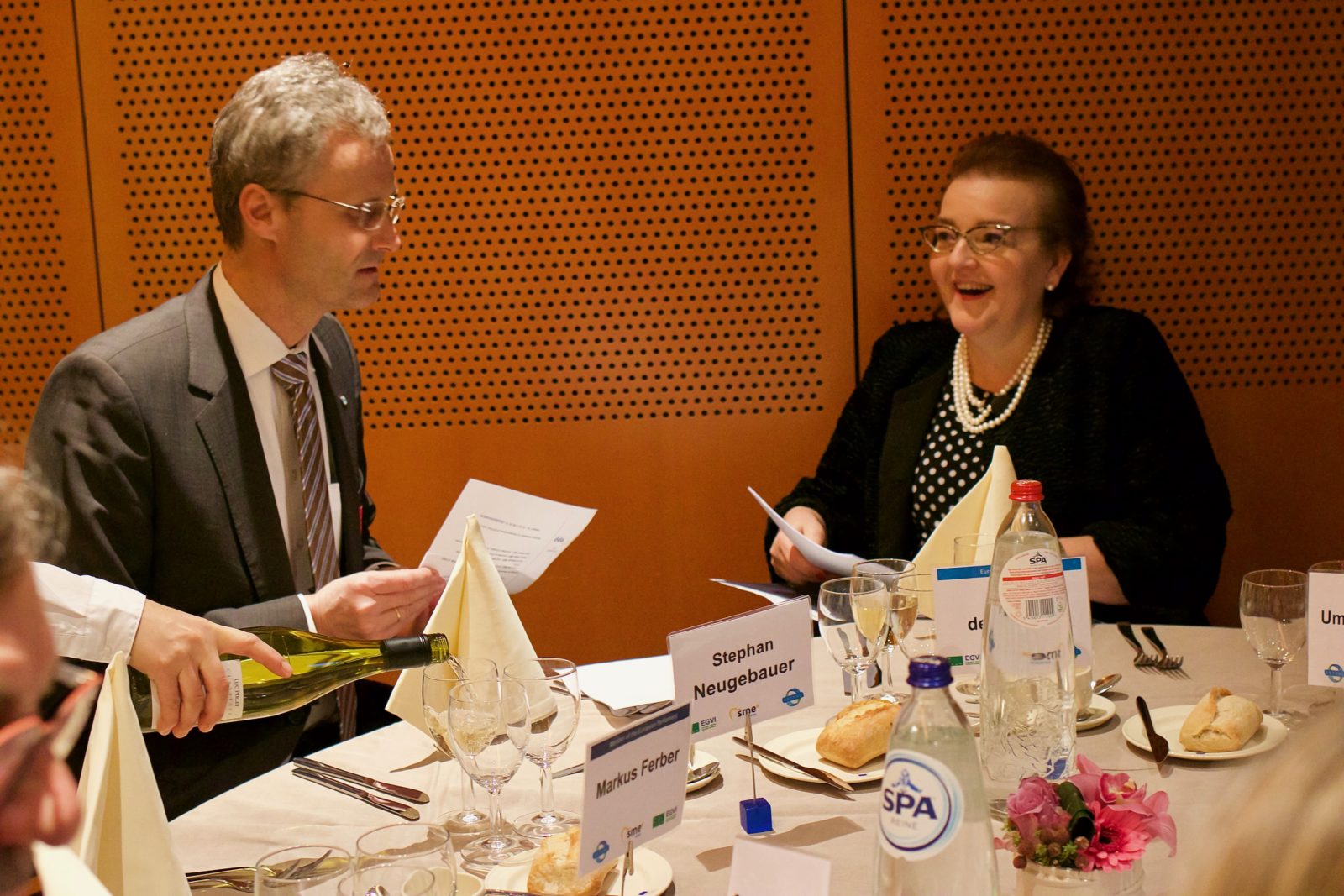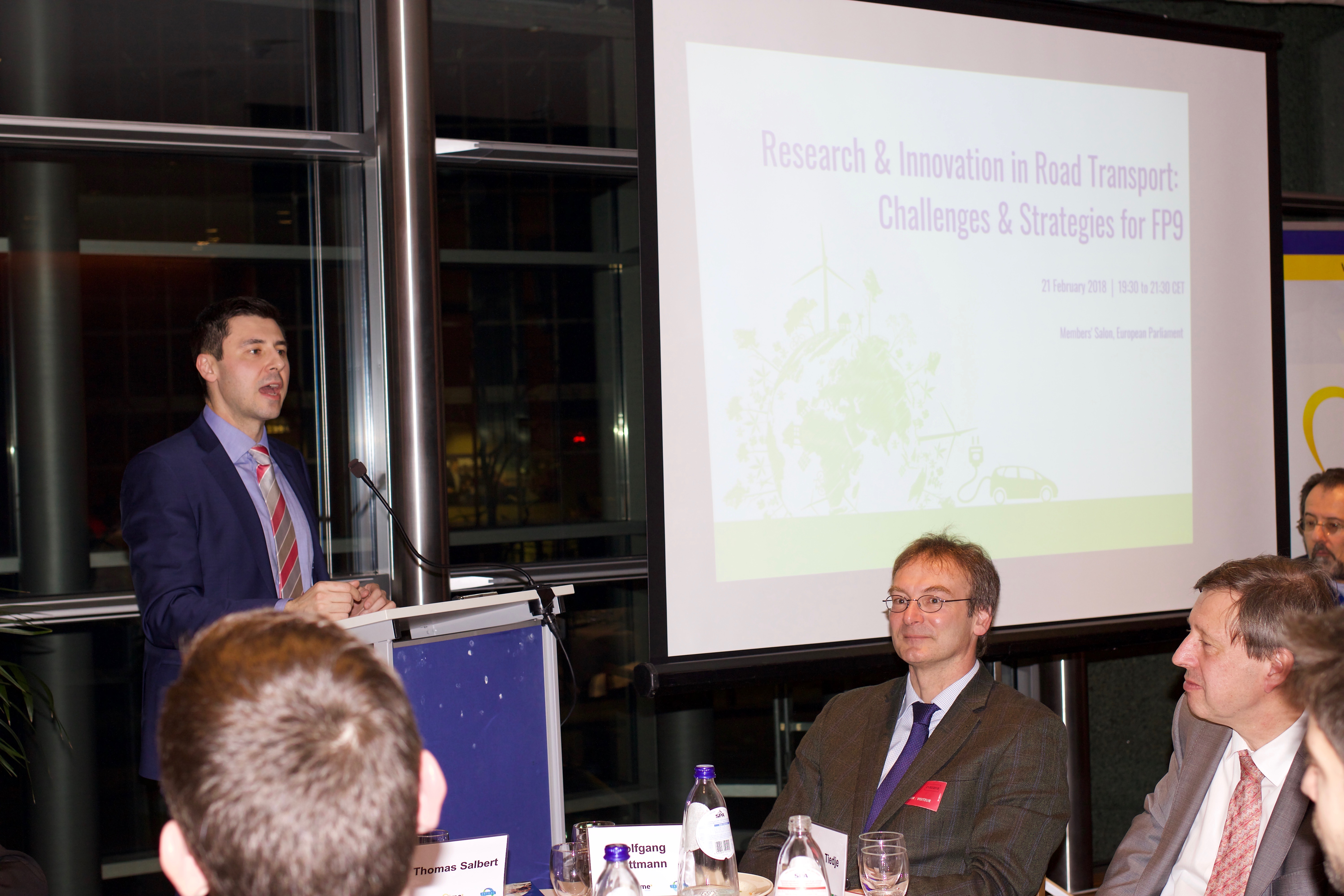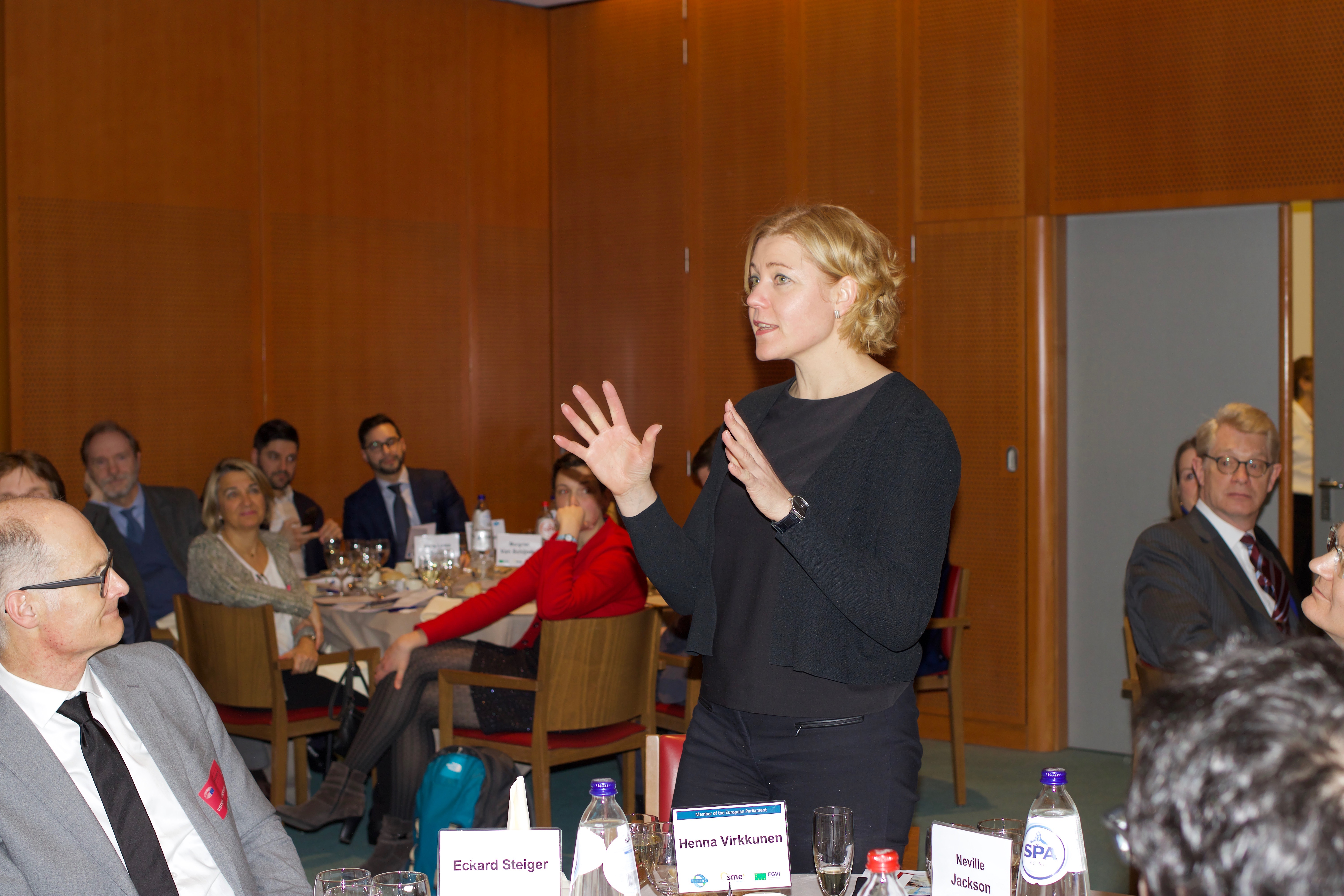“Research & Innovation in Road Transport: Challenges & Strategies for FP9”
On 21st February 2018, SME EUROPE of the EPP in cooperation with the ERTRAC (European Road Research Advisory Council, hosted a Working Dinner event in the European Parliament considering the following thematic: “Research & Innovation in Road Transport: Challenges & Strategies for FP9”. The event featured the following speakers:Paul Rübig MEP, Member of the ITRE and BUDG Committees, Honorary President of SME Europe of the EPP; Clara De La Torre, Director DG RTD, European Commission; Stephan Neugebauer, ERTRAC Chairman and BMW Group Director on Global Research Cooperation; Followed by Workshops at the discussion tables, chaired by: Andor Deli MEP, Member of TRAN Committee and Board Member of SME Europe; Henna Virkunnen MEP, Member of ITRE Committee; Inese Vaidere MEP, Member of BUDG Committee and Board Member of SME Europe of the EPP; Markus Ferber MEP, Vice-Chair of ECON Committee and Senator of the SME Europe of the EPP; Claudia Schmidt MEP, Member of TRAN and CONT Committees.
Dr. Paul Rübig MEP introduced the guests and speakers to the audience. He remarked that technological development plays a key role in the future. Sustainable mobility is a number one priority. Despite of the rising population numbers we need to ensure that people have the same possibilities in mobility as we have now as well as focus on sustainable energy, raw materials and where they come from. Continuous driving, guaranteed parking, sharing solutions and innovations in the area of artificial intelligence are key solutions to a better traffic situation. Also he mentioned the European Parliament fighting for the European edit value that will play a key role in the debate for the budget. What would be the cost when we would not organize our research together? If all Member States would do this individually they would duplicate and triplicate their efforts. The budget of the European Union decreased from 1.09 to 0.9%. To double the budget on this sector is crucial if we want to take a leading role in this area. The consumer should decide and politicians should stay neutral towards new technologies.
Clara De La Torre is convinced that the European Parliament has been a great ally in the noble sense of the word and has always done great work in terms of innovation and research in the framework programme. Innovation is the power of our society and economy. It is safe to say that European programmes have been very important in fostering excellence and innovation and provide solutions to our cities and to ensure the industrial leadership of Europe. The Framework programmes and other initiatives do have occasion to structuring our innovation landscape. The preparation of the Future framework is well on track, we are all engaged in those preparations and this discussion tonight is very enriching for us if anybody comes forward with constructive ideas. The three pillars the new Framework will be based on are: continuation of what has already been implemented; Industrial challenges pillar; the European Innovators councils. Member States are expecting rationalisation of the instruments. We have to do some fine tuning now. It is crucial to let the citizens know what we already have done and what we intend to do. Most likely there will be five clusters in which, for example, transport will be addressing issues like clean transport, safe transport, smart mobility, mobility as a service, decarbonisation of transport. We all know that a large part of the new economy will cover disruptive technologies, there will be jobs and that’s why we have to work now on a programme which last until 2027 so we have to make space for those things to make them happen, which is also why this programme embeds the necessary flexibility. Here are fours facts that hinder a flourishing economy in Europe. One is the funding (we should be having easier approaches that empower innovators) and we should build the bridge from innovators to those who have the finance. We have to attract innovators in Europe and we have to inform what can be done in Europe and to ensure that there are more success stories. The third factor presumes that Europe needs to compete with other regions of the world. What is more important that we have the talents, the skills and the work force We have a lot of potential in Europe for excellent research and innovation because Europe has the motivation, the talent and the resources to lead the worlds next generation of transformational technologies.
Stephan Neugebauer, insists on the necessity to keep up with the world leaders in infrastructure sector, renewable energy and energy. We are now coming to the hot phase of the FP9 programme and all the organisations are now fighting for more budget. We as a community of road transport wanted to share our ideas of the next research programme in general. I think road transport is not a very attractive topic- you may think about energy and congestion but in the end, we consider mobility to be a different story. Mobility is crucial. It represents the heart of our society, crucial for the competitiveness of Europe and jobs, key driver of innovation. There is no other sector that can compete with us in terms of research and innovation and in automotive industries Europe is a world leader. At the moment there are several challenges like decarbonisation, air quality, digitalisation. These are fundamental changes of the mobility systems and that’s why we have to bring together different stakeholders. We need the infrastructure, the energy, the renewable fuels. Even if we put electricity to the highest level of supply we will still need fuels. We need industries, research organisations, universities, SME start- ups, public awareness.. Road transport is always a continental issue, never a national issue. Different sectors, different stakeholders! We want to have an evolution of this framework programme, not a revolution. We want to have a coordination of the European funding because it creates the ecosystem for innovation which is needed for our mission on decarbonisation, digitalisation of road transport systems. Low transport as a mobility system is the most important and fundamental for Europe but also very complex. That is why we strongly recommend that low transport needs come as a separated chapter in the next framework programme. The third point are the instruments: we are dealing with innovation and for that reason we need inclusive research together with industry which is flexible and offers a long-term commitment. We are ready to start immediately because we are in a global race with other states and that’s why we don’t have much time for long discussions. We should start with the instruments we already have at the moment. Let us do it for the planet, for the people and the profit of the European citizens.
Andor Deli MEP is approaching the matter as an average European consumer, that thinks about the future and how to handle energy in the future. Everybody wants to have mobility, to have the benefits that mobility brings along. We are talking a lot about innovation and research in this area but we don’t see it when we drive from Hungary to Brussels (for example. We have to do more and we have to bring the projects from the labs to the streets.
Henna Virkunnen MEP believes that as we are planning the next framework programme we should also focus on the industry views. There are two mega trends going on at the moment: digitalisation and decarbonisation. Digitalisation is an important part of decarbonisation. Quite often when we are speaking of decarbonisation we are talking too much about the fuels but we also have to consider other aspect and how we are planning the whole system together and the technology of the vehicles. All those three parts have to go hand in hand with an efficient system. We still have the possibility to be a front- runner when it comes to green transport. Despite some obstacles and challenges we still know that the car industry is the biggest one in Europe.Now we are on the right path in research and also the Commission has already published its proposals, it just seems that we haven’t worked hard enough on this topic in the past and we know that the transport sector is the only sector where emissions have been growing since 1990. There are only five member states that produce less emissions than in 1990. One of them is Finland because in the past ten years it started intensively to invest in renewable fuels. There were also made some changes in the taxation able encourage the citizens to buy those kind of cars. It is very difficult to get funding for more projects as they don’t fit in the sectors and that is why European Union should save some free funding for these projects.
Markus Ferber MEP believes that the negotiations of the first framework programme in the 1990s were lacking the inspiration of new ideas of today because we have already discussed the development of batteries in the late 90s. When we discussed in the 1990s about how cities will look like around 2000 we imagined skyscrapers, transport in the third dimension.. We have to admit that we did not reach these goals since infrastructure is limited but transport in the third dimension is A solution but not THE solution. Mr. Ferber states that to have the research is good but we should have the benefits of the products as well.








